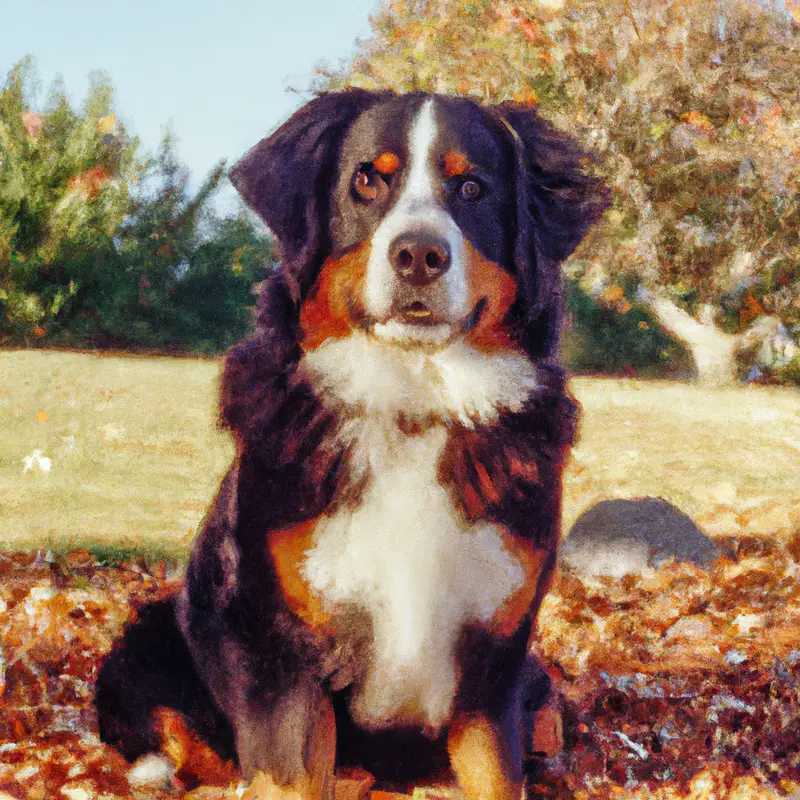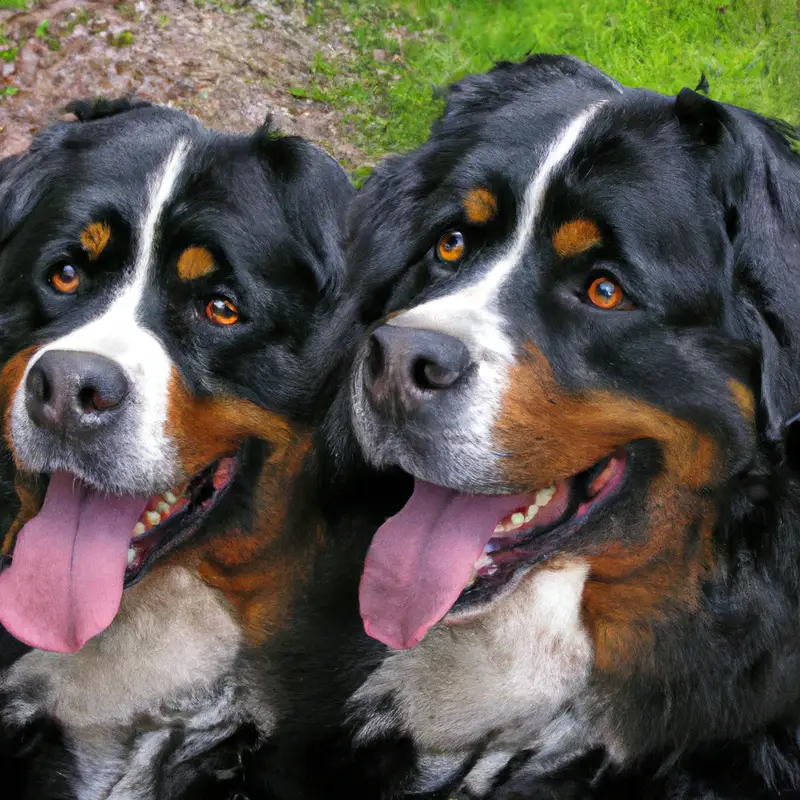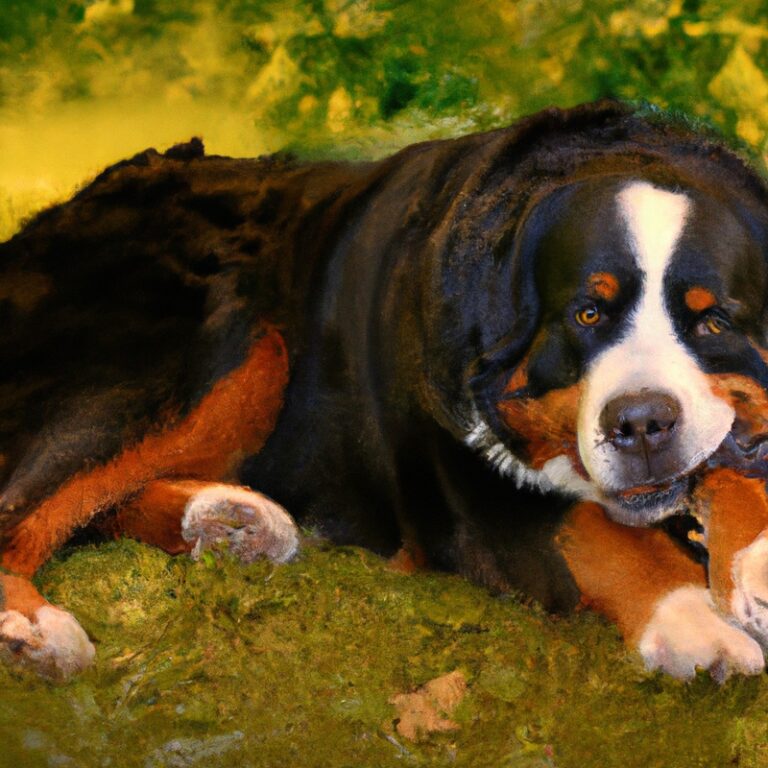What Are The Best Strategies For Preventing Food Aggression In Bernese Mountain Dogs?
Key Takeaways:
- Establish consistent feeding routines to minimize food-related stress and anxiety.
- Use positive reinforcement training techniques to reinforce positive behavior around food.
- Gradually introduce other animals and people into mealtime environments to promote socialization and reduce food aggression.
- Seek professional help if food aggression issues persist or escalate.
Have you ever witnessed your gentle Bernese Mountain Dog transform into a growling, possessive protector of their food?
Food aggression in these lovable giants is not only concerning but can also pose risks to their well-being and training.
As a dog behavior expert, I understand the importance of preventing food aggression to maintain a harmonious and safe environment.
In this article, I will share the most effective strategies to prevent food aggression in Bernese Mountain Dogs, from positive reinforcement training to establishing structured feeding routines.
Get ready to restore peace during mealtime and nurture a healthy relationship with your furry friend.
| Strategy | Description |
|---|---|
| Positive reinforcement | Using rewards and treats to encourage non-aggressive behavior during mealtimes. |
| Food puzzles/toys | Providing interactive toys or puzzles that dispense food slowly, promoting mental stimulation and reducing food aggression. |
| Feeding in separate spaces | Ensuring that each Bernese Mountain Dog has their own designated feeding area to avoid competition and aggression over food. |
| Establishing a feeding routine | Having a consistent schedule for feeding can help reduce anxiety and prevent food aggression. |
| Training and socialization | Proper training and socialization from an early age can help minimize food aggression in Bernese Mountain Dogs. |
| Seeking professional help | If the food aggression persists or escalates, it is advisable to consult with a professional dog trainer or behaviorist. |
Understanding Food Aggression in Bernese Mountain Dogs
What is food aggression?
Food aggression refers to a behavioral issue in which a dog becomes possessive, aggressive, or defensive around their food. It is a display of guarding behavior, where the dog may growl, snap, or even bite when approached while eating.
Food aggression can be triggered by a fear of losing their food or a desire to assert dominance.
It is important to address food aggression through training and behavior modification to ensure the safety of both the dog and those around them.
Why do Bernese Mountain Dogs exhibit food aggression?
Bernese Mountain Dogs may exhibit food aggression due to various reasons. One possible explanation is their natural instinct to guard resources.
This breed has historically been used for guarding and protecting livestock, which could translate to guarding food as well.
Additionally, certain individual dogs may have specific personality traits or experiences that contribute to their food aggression. It is important to address this behavior early on and seek professional guidance to prevent any potential issues.
Signs of food aggression in Bernese Mountain Dogs
Signs of food aggression in Bernese Mountain Dogs can include growling, snapping, or biting when approached while eating, guarding their food bowl or treats, stiff body language, and showing signs of anxiety or possessiveness around food.
They may also become defensive or aggressive if someone gets too close to their food.
It’s important to address these behaviors to prevent any potential harm and create a safer environment for both your dog and those around them.

Importance of Preventing Food Aggression
Potential dangers of food aggression
Food aggression in Bernese Mountain Dogs can lead to several potential dangers. Firstly, it can pose a risk to the safety of other pets or family members who may be near the dog while it is eating.
Secondly, food aggression can create a hostile environment in the home, causing stress and tension among family members.
Additionally, it may also increase the likelihood of bites or injuries to humans or other animals who approach the dog during mealtime. Consequently, it is essential to address food aggression promptly to prevent these potential dangers.

The impact on the dog’s well-being and training
The impact on the dog’s well-being and training is significant when it comes to preventing food aggression in Bernese Mountain Dogs.
Firstly, it helps create a harmonious and stress-free environment for the dog.
Secondly, it ensures that the dog feels safe and secure during mealtimes, reducing the likelihood of aggressive behavior.
Thirdly, it establishes a positive association between food and humans, making training more effective.
Overall, by understanding and addressing food aggression, you can greatly enhance your dog’s well-being and training experience.
Strategies to Prevent Food Aggression
Positive reinforcement training
Positive reinforcement training is an effective way to prevent food aggression in Bernese Mountain Dogs.
This method involves rewarding good behavior with treats, praise, or playtime.
By using positive reinforcement, you can teach your dog that sharing food is a positive experience and discourage possessiveness.
Consistency, patience, and repetition are key in this training approach.
Remember to avoid punishment or harsh methods, as they can worsen aggression.
Stay consistent, reward desired behaviors, and you’ll soon see improvements in your dog’s behavior around food.
Gradual desensitization and counterconditioning
To prevent food aggression in Bernese Mountain Dogs, gradual desensitization and counterconditioning are effective strategies. Gradual desensitization involves exposing the dog to food in a controlled manner, starting with low-value treats and gradually increasing the level of temptation.
Counterconditioning is about pairing the presence of food with positive experiences and rewards, helping the dog associate food with pleasant outcomes.
These methods help the dog learn that sharing food is safe and can be a positive experience.

Establishing a structured feeding routine
Establishing a structured feeding routine is important to prevent food aggression in Bernese Mountain Dogs. Here’s how you can do it:
- Set consistent meal times: Feed your dog at the same times every day to establish a routine and promote a sense of security.
- Use a designated feeding area: Choose a quiet area where your dog can eat without distractions. This helps them feel safe and reduces the likelihood of negative behavior.
- Teach patience: Make your dog wait calmly before you give them their food. This teaches them self-control and prevents them from rushing or guarding their food.
- Practice positive reinforcement: Reward your dog for good behavior during mealtime. This can include sitting calmly or waiting for your signal before eating.
By establishing a structured feeding routine, you can promote a peaceful and stress-free mealtime for your Bernese Mountain Dog.
Providing separate feeding areas for multiple dogs
To prevent food aggression in Bernese Mountain Dogs, it is important to provide separate feeding areas for multiple dogs.
This allows each dog to enjoy their meals without feeling threatened or challenged by other dogs.
It helps to eliminate competition over food, reducing the likelihood of aggressive behavior.
Separate feeding areas can be created by using individual bowls or feeding stations in different locations.
Ensuring that each dog has their own designated space during meal times promotes a peaceful eating environment.
Proper socialization and handling during mealtime
Proper socialization and handling during mealtime is essential to prevent food aggression in Bernese Mountain Dogs. Here’s what you can do:
- Start early: Introduce your Bernese Mountain Dog to various people and animals while they’re still a puppy. This helps them learn to be comfortable and relaxed around others during mealtime.
- Practice positive reinforcement: Reward your dog for calm behavior during mealtime. Use treats or verbal praise to reinforce the idea that mealtime is a positive and peaceful experience.
- Set a routine: Establish a consistent schedule for feeding your dog. This helps them understand when it’s time to eat and reduces anxiety or aggression associated with food.
- Use safe feeding methods: Avoid interrupting your dog’s meal or taking away their food while they are eating. This can trigger aggression. Instead, try gradually increasing the distance between you and your dog during meals to build trust.
- Seek professional help if needed: If your Bernese Mountain Dog shows persistent signs of food aggression, consult with a professional dog trainer or behaviorist. They can provide specialized guidance tailored to your dog’s needs.
Additional Tips and Considerations
Consulting with a professional dog trainer or behaviorist
If you’re dealing with food aggression in your Bernese Mountain Dog, it’s helpful to consult with a professional dog trainer or behaviorist. They have the expertise and experience to assess your dog’s specific situation and provide personalized strategies to address the issue.
A professional can help you understand the root cause of food aggression and guide you through effective training techniques to manage and prevent it.
Working with a professional ensures that you receive expert guidance and support tailored to your dog’s needs.
Avoiding punishment-based training methods
To avoid using punishment-based training methods when preventing food aggression in Bernese Mountain Dogs, it’s important to focus on positive reinforcement and reward-based training. Instead of punishing your dog for aggressive behavior, reward them for calm and appropriate behavior around food.
Use treats and praise when your dog remains calm while eating or when they exhibit good behavior around food.
This will create a positive association with mealtime and help prevent food aggression in your Bernese Mountain Dog.
Consistency and patience in implementing prevention strategies
Consistency and patience are key when it comes to implementing prevention strategies for food aggression in Bernese Mountain Dogs. You need to make sure that you consistently follow the same routine during meal times, such as feeding them in the same location and at the same time every day.
Additionally, it’s important to be patient and allow your dog to eat at their own pace without interruptions or distractions.
This will help establish a sense of security and reduce the likelihood of food aggression.
Monitoring and managing the dog’s food intake
To prevent food aggression in Bernese Mountain Dogs, it is essential to monitor and manage their food intake. Here are some strategies:
- Establish a regular feeding schedule and stick to it. This helps your dog develop a routine and reduces the likelihood of resource guarding.
- Use portion control to prevent overeating. Follow the recommended daily amount for their age, size, and activity level.
- Feed meals in a calm and quiet environment. Avoid distractions and ensure that your dog feels safe and relaxed during mealtime.
- Teach your dog basic obedience commands, such as “sit” and “wait,” to establish control around food. This reinforces your role as the pack leader and prevents food-related conflicts.
- Consider using interactive food toys or puzzle feeders to stimulate their minds and provide mental enrichment.
Remember, proper monitoring and managing of your Bernese Mountain Dog’s food intake can help prevent and manage food aggression behaviors.
Using food puzzle toys and interactive feeders
Food puzzle toys and interactive feeders are great tools for preventing food aggression in Bernese Mountain Dogs.
They provide mental stimulation and slow down eating, which can help reduce a dog’s guarding behavior.
These toys make dogs work to get their food, engaging their problem-solving skills and keeping them focused on something positive.
Some popular options include Kong toys, treat-dispensing balls, and puzzle feeders.
Introducing these toys during mealtime can make eating a fun and engaging activity for your Bernese Mountain Dog.
Frequently Asked Questions
Can food aggression in Bernese Mountain Dogs be completely eliminated?
Food aggression in Bernese Mountain Dogs can be managed and reduced, but it may be difficult to completely eliminate it.
This behavior is rooted in their instinctual nature and can arise from various underlying factors.
Consistent training, socialization, and positive reinforcement techniques can help in minimizing food aggression.
Seeking guidance from a professional dog trainer or behaviorist is recommended for a more comprehensive approach to addressing and managing food aggression in Bernese Mountain Dogs.
How long does it take to see results when implementing prevention strategies?
Implementing prevention strategies for food aggression in Bernese Mountain Dogs can yield results in as little as a few weeks. However, the timeline may vary depending on factors such as the dog’s age, previous training, and the severity of the aggression.
Consistency and patience are key; using positive reinforcement techniques, proper training, and gradually increasing the dog’s comfort around food can help speed up the process.
It’s important to remember that each dog is unique, so results may vary.
Are there any specific breed traits that contribute to food aggression in Bernese Mountain Dogs?
Bernese Mountain Dogs are generally a friendly and gentle breed. However, like any dog, individual temperament and experiences can play a role in food aggression.
While there are no specific breed traits that directly contribute to food aggression in Bernese Mountain Dogs, it is important to note that any dog, regardless of breed, can exhibit this behavior.
Proper training, socialization, and understanding your dog’s individual needs can help prevent and manage food aggression in Bernese Mountain Dogs.
Are there any medical conditions that can cause or exacerbate food aggression?
Yes, medical conditions can play a role in causing or worsening food aggression in Bernese Mountain Dogs.
Some conditions may cause discomfort or pain while eating, leading to defensive or aggressive behaviors.
This can include issues such as dental problems, gastrointestinal disorders, and food allergies.
It’s important to consult with a veterinarian to rule out any underlying medical issues that may be contributing to your dog’s food aggression.
What if prevention strategies do not work?
What if prevention strategies do not work? If your Bernese Mountain Dog is still exhibiting food aggression despite your best efforts to prevent it, it is important to consult with a professional dog trainer or behaviorist.
They can provide further guidance and develop a tailored plan to address the issue.
It’s important to address food aggression promptly and properly, as it can escalate and become a more serious problem if left unchecked. Remember, seeking professional help is key to ensuring the safety and well-being of both you and your dog.
Final Verdict
Preventing food aggression in Bernese Mountain Dogs is essential for their well-being and the safety of those around them.
By understanding the root causes of food aggression and implementing positive reinforcement training, gradual desensitization, and a structured feeding routine, owners can effectively manage this behavior.
Consulting with a professional and avoiding punishment-based methods are also crucial.
With consistency, patience, and proper management, food aggression in Bernese Mountain Dogs can be successfully addressed.
Remember, every dog is unique, and if prevention strategies do not work, it is important to seek professional guidance.







